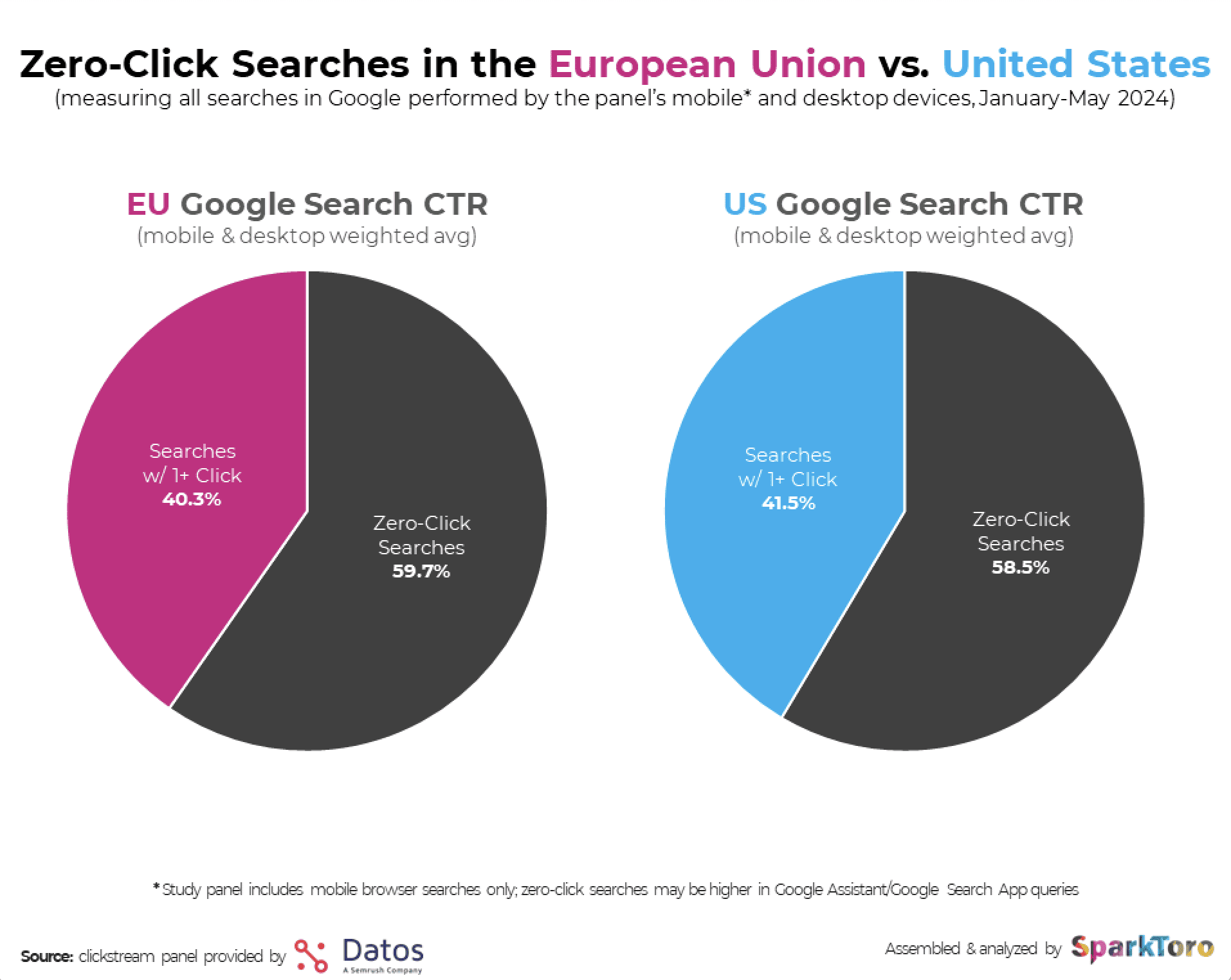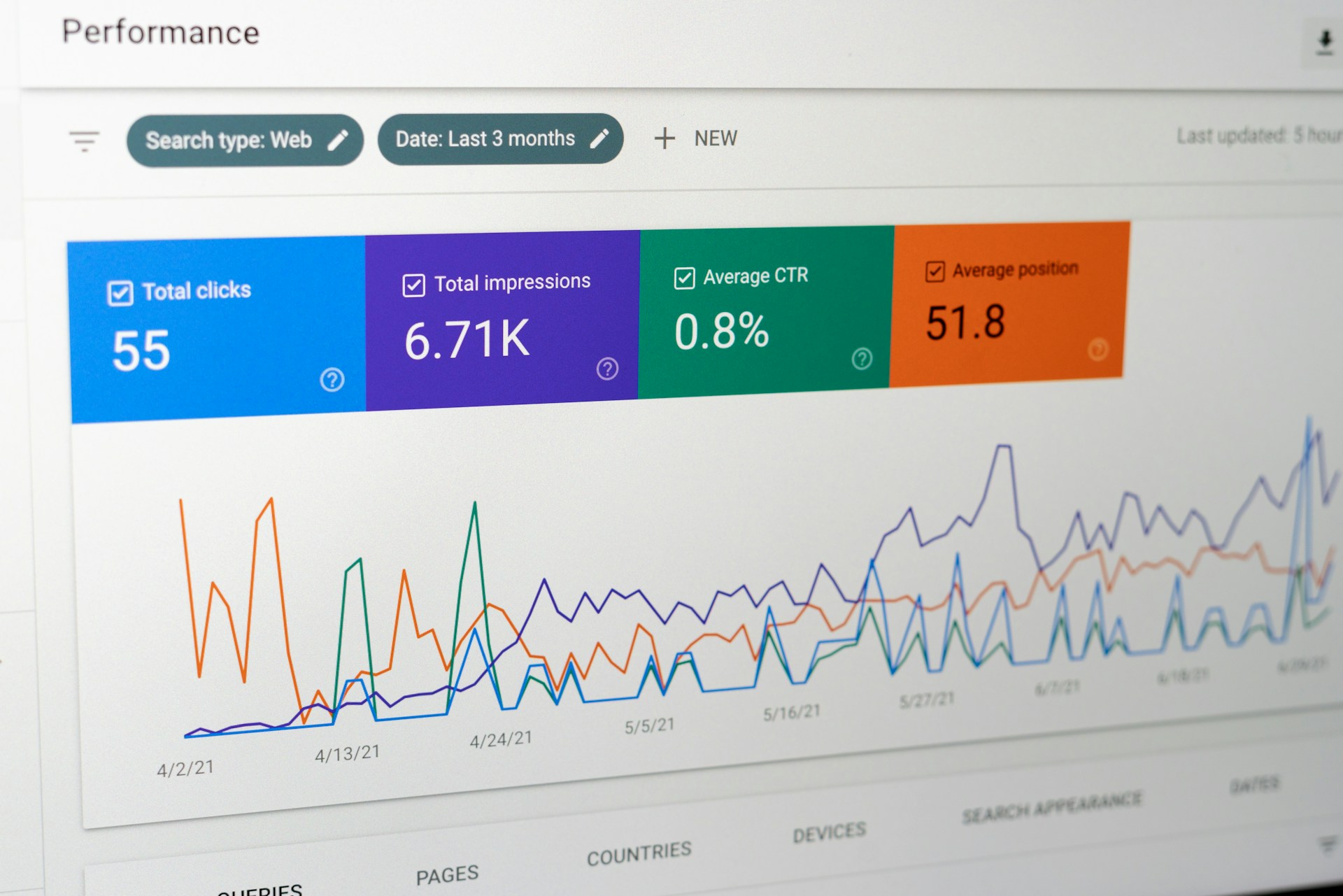The impact of AI on SEO: Here's what you need to know

Andy Crestodina is one of my great heroes in content marketing. I have been following him for years, have his fantastic book Content Chemistry on my bookshelf, and I have learned a lot from him about content marketing and SEO.
In other words, when Andy says something, I pay attention.
In November 2024, he published an extensive article on the impact of AI on SEO. In this article, he names three "disruptions," sweeping changes, and gives concrete advice for how to deal with them.
Below is a summary of the article with my additions.
Focus on visit-website-intention search terms to still get search traffic to your website.
Radical change 1: AI Overviews in Google reduce organic website visitors (not yet in the EU)
Google is increasingly showing AI Overviews at the top of search results. This eliminates the need for people to click through to websites. This is part of a trend that has been going on for some time: as of May 2024, as many as around 60% of searches no longer lead to traffic to a website.

Source image: Sparktoro
What can you do?
Fortunately, there is also good news: there are also searches that clearly show intent to visit a website.
So Andy advises focusing on these "visit-website-intention" search terms. These are search terms that people use when they are looking for in-depth information on websites, and they also tend to generate more valuable traffic.
This advice aligns well with what we teach our clients in our marketing and sales program. By focusing on the Big 5 blog topics and bottom of the funnel search terms, you attract readers who have a buying intent and are looking for in-depth information that will help them make a buying decision.
AI Overviews are not yet available in the European Union. Presumably this has to do with the strict privacy rules that apply here. But even without AI Overviews, it makes sense to optimize for 'visit-website-intention' search terms. After all, organic search traffic has been declining for some time, thanks to things like featured snippets, knowledge panels and, of course, ads.
Some marketers will use AI to generate a large quantity of mediocre-quality articles. Other marketers will continue to focus on quality.
Drastic change 2: We (but also the algorithms) will have to deal with a flood of AI-generated content
Now that anyone can generate large-scale content with AI, a tidal wave of low-quality content is looming. In fact, we are already having to deal with it. This can lead to a negative spiral in which users drop out, content creators stop publishing and AI models no longer have good training data.
What can you do?
"For marketers and brands, a flood of garbage content is an opportunity," Andy argues. You can make a difference with quality content.
So create content that AI tools can't create. Andy recommends collaborating with influencers, creating videos*, sharing your own vision (thought leadership) and doing original research.
Some marketers will use AI to generate a large quantity of mediocre-quality articles. Other marketers will continue to focus on quality.
- They publish memorable content and thus stay top-of-mind.
- They publish content that starts conversations and generates word of mouth.
- They publish thought leadership content and gain a loyal following.
- They publish content that brings people together and builds community.
As Andy writes, these marketers may also be using AI, but they are using it to make better things, not to make more things.
*Here's some things to be said. With HeyGen, you can already create an AI version of yourself that speaks 175 different languages. If you feed that with a decent script, you can just make videos without having to be in front of the camera yourself.
Also read: Do I still need a content manager with AI?
The question we need to ask is: how can we make sure AI recommends our content? - Andy Crestodina
Drastic change 3: AI chatbots take over role of search engines
People are discovering that they can use AI as an alternative to Google. For many searches, this is faster and easier. Personally, I almost exclusively use Perplexity (Pro) instead of Google. With it, I get an immediate answer to my question with links to different sources, instead of having to click through a list of links myself. ChatGPT has also had a search function since the end of October 2024.
What can you do?
This is still an unexplored area, according to Andy. We don't even know what to call this type of SEO yet. AI Optimization (AIO)? Generative Engine Optimization (GEO)?
But the question we need to ask, according to Andy, is: how can we make sure AI recommends our content?
What you could try (we don't know if it works yet):
- Give AI bots access to your website (don't block them in your robots.txt file)
- Communicate your value proposition clearly
- Be present in relevant directories
- Collaborate with influencers on new, original research
- Publish content on different websites (guest blogging!)
- Write a press release, as it is often posted on various websites and that increases the chances of it ending up in AI training data
- Create videos and podcasts with transcripts
- Be active where your target audience is
Ultimately, these are all things that a marketer dealing with SEO, content marketing, PR and social media is already doing. So the channels have changed, Andy said, but the strategies have remained largely the same.
Quality and originality continue to make the difference
The impact of AI on SEO is undeniable. From AI Overviews in Google to chatbots taking over the role of search engines - it is causing major changes in how people search for information online. But these changes also present opportunities for marketers who (continue to) focus on quality and originality.
At Buzzlytics, we teach our clients to write articles and create videos that make you stand out in these times of mediocre AI content.
The articles a content manager learns to write in our marketing and sales program are based on original insights from internal experts and have a depth that AI tools cannot match. This doesn't mean we don't use AI tools; we do plenty. But we believe in AI-assisted writing rather than AI-generated writing: AI tools are a good assistant to a content manager, not a replacement.
Would you like to learn how to combine the principles of They Ask, You Answer (TAYA) with AI? Then our AI workshop may be of interest to you. You do not need any prior knowledge of TAYA for this. We will teach you what you need to know during the workshop.
Related articles
November 7, 2024
-
Reading time: +/- 8 min
May 16, 2024
-
Reading time: +/- 11 min








